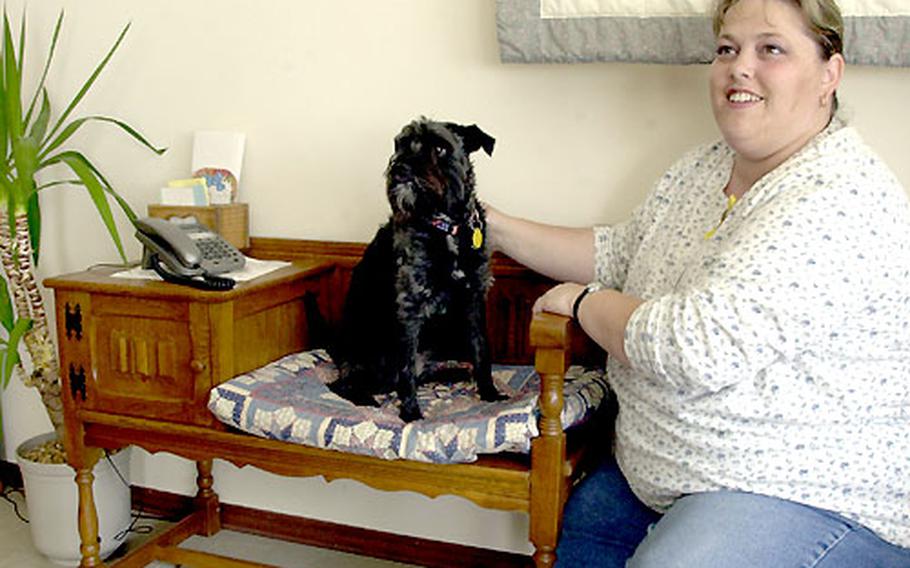
Tina Olson, a Baumholder sperrmüller, hit the jackpot recently when she found a German telephone table similar to this one. Olson donated the table to the base high school fund-raiser and it brought $575 at auction. (Terry Boyd / S&S)
BAUMHOLDER, Germany — One evening not too long ago, Lisa Box was driving home to Baumholder from an excursion to the medieval river town of Bernkastel-Kues when she noticed piles of junk on the side of the road.
Box did what any local sperrmüller would do — she called Mark Wojcik, the king of sperrmülling in these parts.
“He said, ‘I can’t come. sperrmüll away!’ ” Box said. And she did, finding several treasures, including an unusual large rug made of leather strips. She added the rug to her other Sperrmüll finds including 1950s retro furniture.
Sperrmüll — German for “bulky refuse” — is an incredibly foreign-sounding word. It has come to describe a completely foreign concept to most Americans: sorting through household items thrown out to the street curb in search of cast-off treasures. But in this part of west- central Germany, more and more people in the military community are joining sperrmüllers such as Box and Wojcik.
It takes a couple of times out to get past being a little self-conscious about rooting through junk, Box said. But luck into a big find, and “it’s awesome! Mark’s not kidding when he says you get addicted,” she said.
Sperrmülling is “way better” than yard sales back home “because I keep all my money,” said Tina Olson, Family Readiness Group leader at Smith Barracks in Baumholder.
“It’s self-reinforcing activity. One reward in the whole group, and you’re hooked,” Wojcik said.
Olson claims the big score of the year so far. Wojcik and Olson were sperrmülling in Idar-Oberstein last spring.
Somehow, Olson spotted a telephone table nearly obscured under other, less desirable, discards.
She took the table home, cleaned it up, then donated it to Baumholder High School’s May 16 fund-raiser auction, where it brought a top bid of $575.
In only four sperrmülling expeditions, Olson figures she’s found $1,000 worth of items, including the telephone table and gold-edged porcelain plates, saucers, cups and gravy dish that go perfectly with a set she already had.
Wojcik, Box and Olson are in it for fun and profit. But mostly fun.
“It was a riot!” Olson said. “Especially when you find that one little thing.” Their competition is not so casual.
A big percentage of vendors at German flea markets get their inventory from Sperrmüll, Wojcik said, adding that even antique dealers are known to pick a pile or two.
Of course, Americans’ attitudes about such items are, to paraphrase President Bush, different than in the Old Europe. What’s probably most difficult for Americans to understand is why Germans throw away perfectly serviceable — and sometimes clearly valuable — belongings.
The reason boils down to cultural differences. Value is relative, Wojcik said.
Something has to be 200 or 300 years old to even be considered old in Germany, he said.
“I see people using stuff here everyday that’s older than the rocks we have in the States,” he said.
Moreover, it’s not unusual for generations of a German family to live in a house for centuries — a house jammed with detritus of the ages.
“When something comes in, something has to leave,” Wojcik said.
So occasionally, sperrmüllers happen on incredible finds. During his 2½ years in Baumholder, Wojcik, an Air Force retiree and local Boy Scout leader, could re-create the warehouse scene at the end of “Raiders of the Lost Ark.”
Salvaged items fill his house and storage shed in Ruschberg, near the 1st Armored Division base at Baumholder. A large dining room buffet. Antique wood skis. An aged, hand-carved wood pulley. Then there’s the dishware, and the full set of crystal he found, not to mention the pottery. An old potato wagon. Recently, he found a bag full of Reich marks, German currency from World War II with Adolf Hitler’s face on each bill.
“I couldn’t believe it,” Wojcik said. “I went up to the guy’s house and I said, ‘Don’t you want these?’ And he looked at me and said, ‘They aren’t worth anything.’
“Well, to collectors of World War II memorabilia, they may be worth a lot. They aren’t making them anymore,” Wojcik said.
Helpful hints for successful sperrmülling:
¶ Sperrmüllers must observe one main rule of etiquette — don’t make a mess,” said Wojcik. “Germans will wash, press and fold clothes, then carefully box them up to be thrown away,” he said. So don’t just scatter the junk. “Try not to have it all over the street,” he said.
¶ The optimum time to get out is the day before a town’s or village’s scheduled junk pick-up, Wojcik said. Hit the town about 2 p.m., then come back a second or third time, because many of the people are in their 80s and 90s, so they just bring a few pieces out at a time.
¶ Rural villages, especially in the Rhineland-Pfalz area around Baumholder, are better for sperrmülling than large towns or cities. And don’t forget your map.
¶ Take someone with you because you might need help spotting big finds, then loading them up, said Lisa Box. “Of course, if you don’t take someone, that leaves more room in the car for Sperrmüll,” she said.